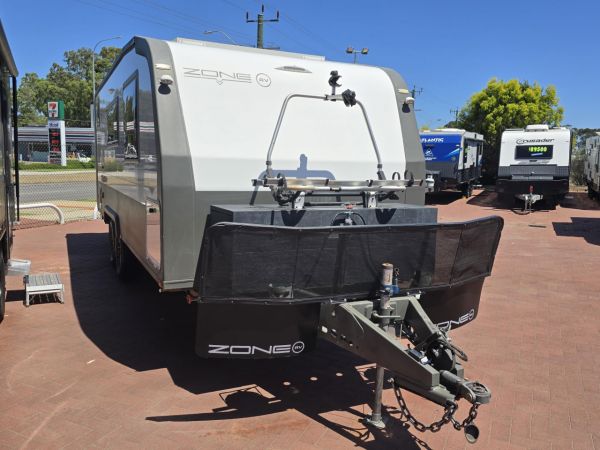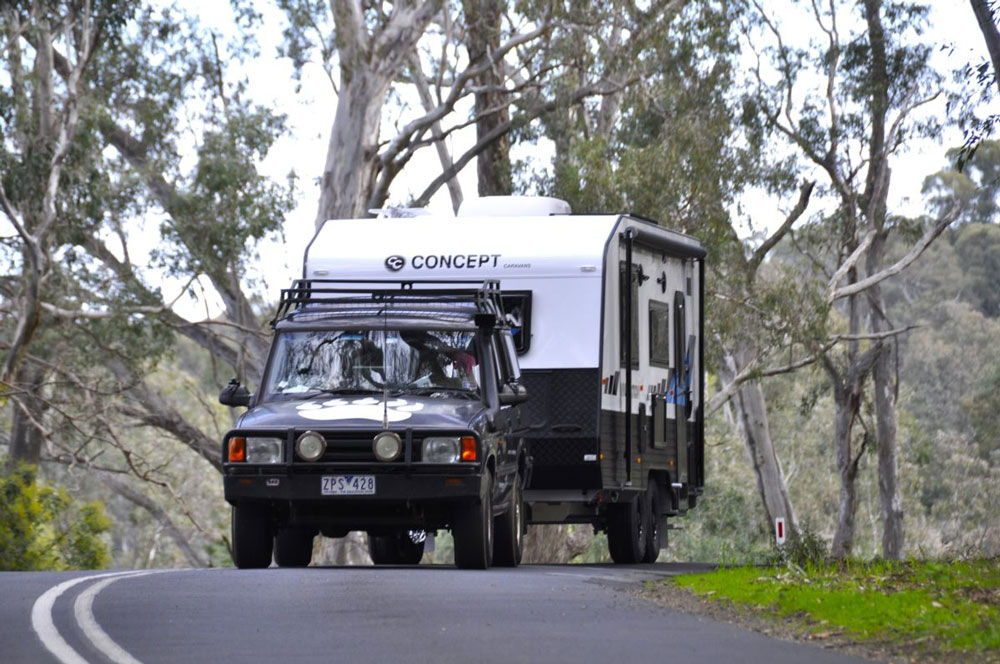
Towing a Caravan: Tips for First Timers
So, you’re ready to take on the wonderful world of caravanning, but feeling daunted by towing such a large trailer for the first time. I've got you covered!
Whether you are taking on the big lap or just some local destinations, the basics of towing a caravan are the same. Of course, should you intend to take the rough roads, you may need to consider your style of rig further to ensure you get to that dream destination and back safely!
I've written this guide to equip you with everything you need to know before towing a caravan for the first time so you can do so safely, confidently, and legally.
Caravan Towing Terms
Before we get into the tips, let's cover some of the basic terminology you'll need to know about towing. These are weight calculations to make sure you're within a safe range.
Tare
The tare weight is the weight of an empty vehicle, including all essential fluids like oil and coolant, but with only 10 liters of fuel in the tank. For a caravan, it doesn’t include any load, water, gas, or accessories. Just the bare essentials.
Kerb Mass
Kerb mass is similar to tare mass but includes a full tank of fuel instead of just 10 litres. It also accounts for the driver and essential fluids like oil and coolant, but doesn’t include accessories like bull bars, tow bars, or roof racks, nor does it account for luggage or supplies. In other words, kerb mass includes you behind the wheel with a full tank of petrol, getting ready to drive.
Payload
Payload is the maximum weight your vehicle can safely carry, as specified by the manufacturer. You can calculate it by subtracting the vehicle's Kerb Mass from its Gross Vehicle Mass (GVM). This includes the weight of all passengers, their luggage, and any extras like food, drinks, clothes, and accessories.
Gross Vehicle Mass
The Gross Vehicle Mass (GVM) is the heaviest your vehicle can safely be when fully loaded. That includes everything: passengers, luggage, accessories, and even the weight on the tow ball if you’re towing. It’s set by the manufacturer, so staying under this limit is important for safety and proper handling.
Gross Trailer Mass
The Gross Trailer Mass (GTM) is like the GVM, but for your trailer or caravan. It’s the maximum weight your trailer can safely be when fully loaded, including everything inside and attached, such as gear or water. Just like with your vehicle, it’s important to stay within this limit for safety.
Gross Combination Mass
The Gross Combination Mass (GCM) is the maximum combined weight of your fully-loaded vehicle and caravan. This includes everything! Your vehicle, caravan, passengers, gear, and all cargo. The tow vehicle manufacturer sets this limit for safe towing, so it’s important not to exceed it to ensure your vehicle handles properly and stays safe on the road.
Tow Ball Weight/Download
Tow ball weight (or download) is the amount of weight pressing down on the tow hitch when your trailer or caravan is fully loaded. This can change depending on how you load the trailer, with more weight in the front increasing the tow ball weight. It’s important to keep this in check for safe towing and to prevent overloading the tow bar.
How to Check Your Towing Weight
Checking your towing weight is important not only for safety, but for legal compliance and for your insurance. Keeping within the towing limits can also improve your driving experience, since a correctly loaded caravan is much easier to control. The right load balance will reduce sway, get you better fuel efficiency, and reduce your risk of a crash.
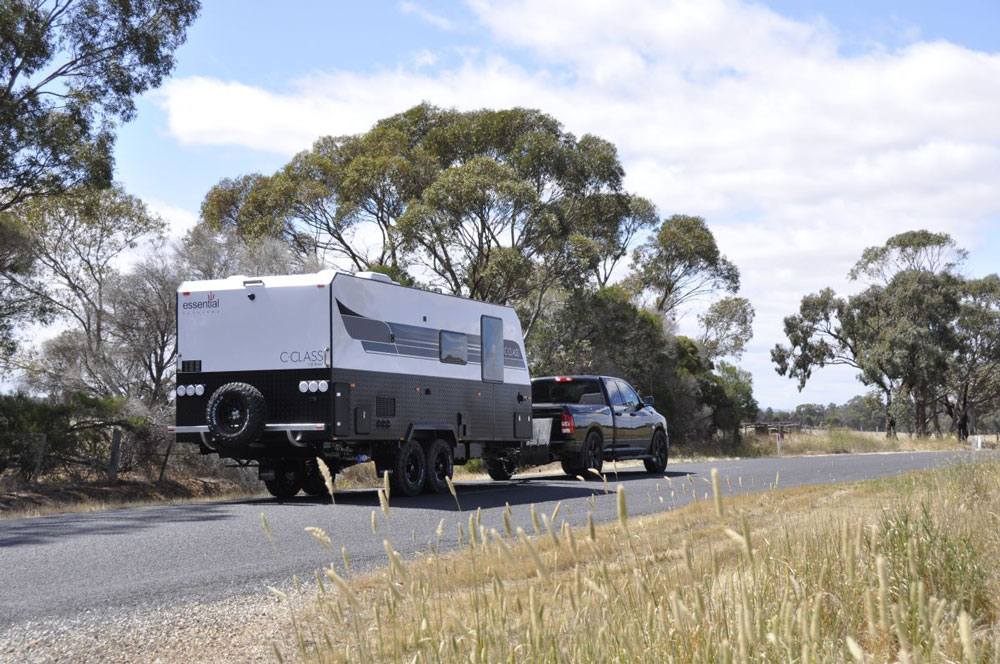
Getting the Actual Weight
When it's time to check your towing weight, take your rig to a public weighbridge to check its actual, not quoted, weights and calculate your real payload availability. You may well find some surprises! Manufacturers and dealers often supply trailers with weights close to the maximum capacities. A fully loaded caravan may well exceed the prescribed maximum weight.
Many people push their vehicle and caravan weight capacities to the maximum. In reality, you should consider minimising trailer and load weight for greater safety! The simple act of filling the gas bottles, water tanks, and fridge may easily add enough extra weight to take you over the limits.
Brakes and Capacities
In Australia, the maximum allowable weight for a trailer (including camper trailers and caravans) is limited by either the capacity of the tow vehicle’s towbar or the towing capacity set by the vehicle manufacturer, whichever is lower. This means you need to make sure that the trailer's weight doesn’t exceed what the tow vehicle is rated to safely handle.
If your trailer has a Gross Trailer Mass (GTM) over 750kg, it must be equipped with a brake system that works on all wheels of at least one axle. Additionally, if the trailer's weight exceeds 2000kg GTM, it must have brakes on all of its wheels. This ensures the trailer is safe to tow and helps with stopping power you will need when you're driving.
For trailers or caravans weighing more than 2000kg, it also needs to have brakes that you can control from the driver’s seat. Plus, it must have breakaway brakes that automatically kick in and hold the brakes on for at least 15 minutes if the trailer gets detached from the towing vehicle. Over-run brakes aren’t allowed on these heavier trailers. Most caravans come with electric brakes and a controller to make towing safer and easier.
If Towing an Older Caravan
If you have an older caravan, especially one built before the Australian Design Rules (ADR) changes in 1989, there are a few things to keep in mind. Many of these older trailers might still be registered and roadworthy, but they may not meet the newer safety standards, like having brakes for trailers over 750kg or the four-wheel breakaway systems required for combinations over 2000kg. This could make the setup illegal and void your insurance! It’s always a good idea to check if your older caravan meets current safety rules.
Caravan Towing Safety Tips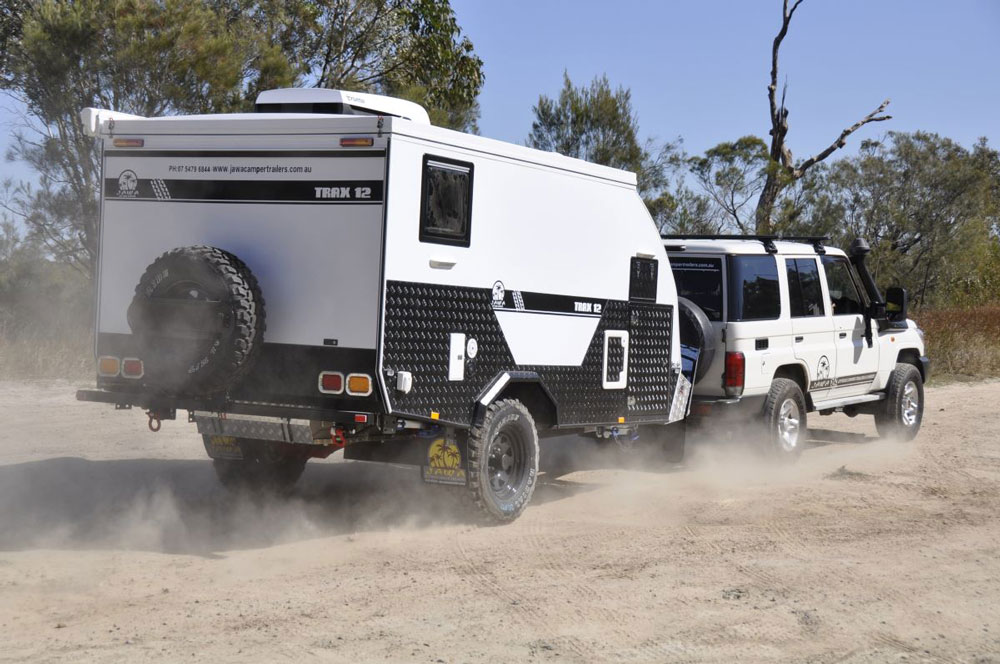
Check Your Tyres
Before towing your caravan, always check the tyre pressure and overall condition. For long trips on smooth highways, pumping up the tyres to the recommended maximum will give you a more stable and comfortable ride. Make sure to check them when they’re warm, since the pressure increases with heat and movement on the road. If you're heading off-road on rocky or sandy tracks, lower the tyre pressure a bit to improve grip, spread the load, and reduce the risk of blowouts.
Use Your Headlights
It's a good idea to keep your headlights on, both day and night, for added visibility. Just remember, the extra load from towing a caravan can tilt the angle of your headlights, which might blind oncoming drivers. This is another reason why even loading is so important. Some newer vehicles have self-adjusting headlights, but if yours doesn’t, it's worth having a mechanic check the light alignment when you're fully loaded.
Turn with a Wider Arc
When you're towing a caravan, you'll need to take wider turns and pay extra attention to your position in traffic. While it's only legal to take up more than one lane if you have “Do Not Overtake Turning Vehicle” signs, in real-life situations, you might occasionally need to use more space to make a safe, tight turn. Just be mindful of other drivers and give yourself plenty of room.
Increase Your Following Distance
Towing a caravan means your stopping distance is longer, so make sure to slow down and keep a greater distance between you and the vehicle in front. According to the Australian Road Rules, if your vehicle and caravan combo is longer than 7.5m (about 24ft 7in), you must stay at least 60m behind another vehicle, or 200m if you’re outside built-up areas. This extra space helps you stop safely and gives you more time to react.
Check Your Height
Always check the height of your load and write it down on a sticky note for your dashboard. Trust me, this can come in handy! I’ve had a few close calls with low bridge clearances, and having the height written down right in front of me made all the difference in making a quick, stress-free decision.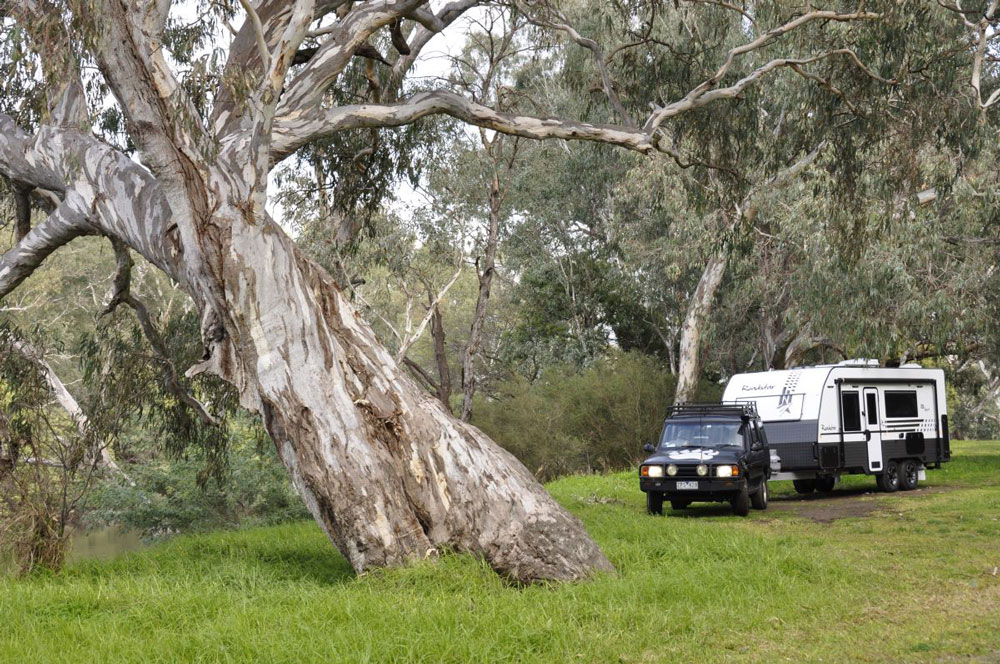
Practise Reversing
Find a quiet car park or open space to practice, so you can get comfortable with reversing without any pressure. While it’s great to have an experienced driver with you, sometimes it's better to just go for it on your own. Fewer distractions and no confusing advice!
These days, most caravans come with reversing cameras to help guide you, and there’s a whole range of towing accessories that can make your setup more stable. Things like weight distribution hitches, towing mirrors, and sway controllers all help improve vehicle control, making your towing experience a lot smoother.
Watch Your Speed
When towing, always drive to the conditions, taking into account your vehicle, load, and your own comfort level. Don’t just follow the speed limits. Some vehicle manufacturers will also specify a maximum towing speed, so be sure to stick to that. And remember, you’ll need extra braking distance when towing.
In NSW, the maximum speed for a vehicle and trailer combination over 4500kg is 100km/h, and this rule applies in most other states too. Personally, I think 100km/h is fast enough for towing any load, regardless of the legal limits.
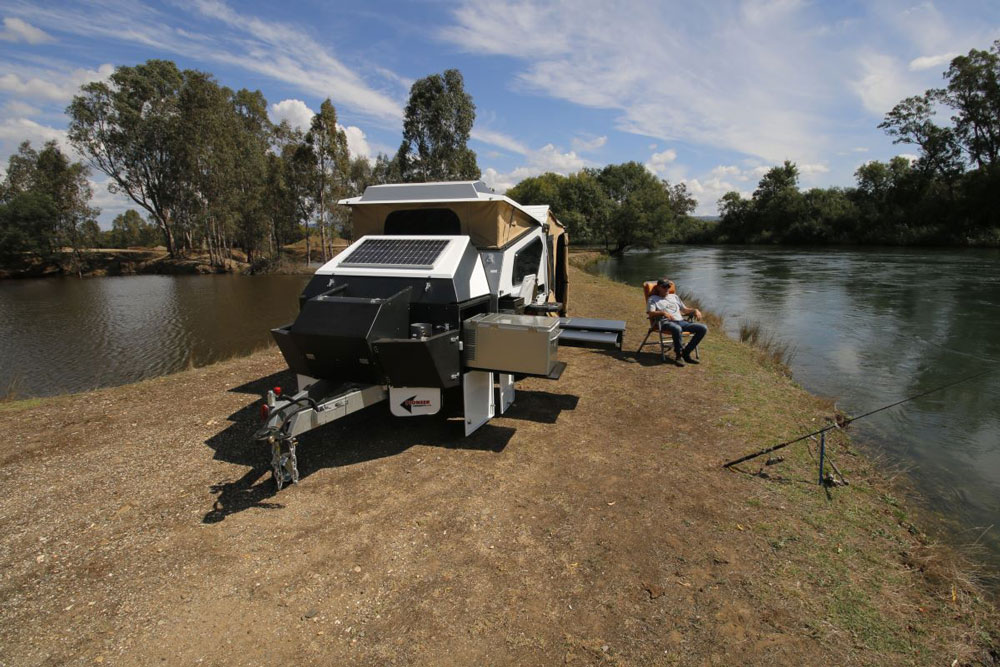
Check the Traffic (and the Weather)
Once you’ve gone over all your trailering checks, including the lights, and loaded up, it’s time to hit the road. Nobody enjoys the stop-and-start of peak-hour traffic, so try to plan your trip around it. Also, wet roads can seriously impact your stopping distance, so it’s always a good idea to check the weather forecast before you head out.
What to Do if You Sway
One of the most common causes of towing accidents is swaying, but if it happens, don’t panic! Avoid braking, as that can cause a rollover. If you have a brake controller, use the override to apply the trailer brakes only. This should help straighten the load and slow things down. If you don’t have a brake controller, or if you’re using a push/pull system, gently apply power to straighten the load, then slow down as quickly as possible.
Also, remember that trucks have blind spots, especially on the passenger side. Be extra cautious when merging or driving alongside them on a multi-lane road. If you can, pull ahead or fall back a little for a safer ride.
Keep a Consistent Speed
Staying at a steady speed is not just courteous, it’s safer for everyone on the road. Many recreational drivers don’t realise that heavy vehicles are speed-limited to 100 km/h. Few things are more frustrating for other road users than a slow-moving vehicle that suddenly speeds up on straight stretches or overtaking lanes.
By maintaining a consistent speed, you make it easier for others to judge your movements and overtake safely. Modern trucks are powerful, and their tight schedules mean they need to keep moving at steady speeds. Show them respect, especially at night when interstate trucking is in full swing. Everyone benefits from a bit of patience and awareness on the road!
Be Prepared
Australia’s wide-open roads can be breathtaking, but they also come with long stretches of isolation. If something goes wrong, being prepared can make all the difference. Start with a solid tool kit for roadside repairs, and remember that your caravan’s wheel nuts might not match your towing vehicle’s. A four-way wheel brace and an independent jack are must-haves.
Don’t forget to check that your spare wheels are in good shape and properly inflated. Fresh water is a lifesaver if you end up stuck on a hot, dusty road. And lastly, a well-stocked First Aid Kit—and some basic training to use it—could save a life, maybe even your own!
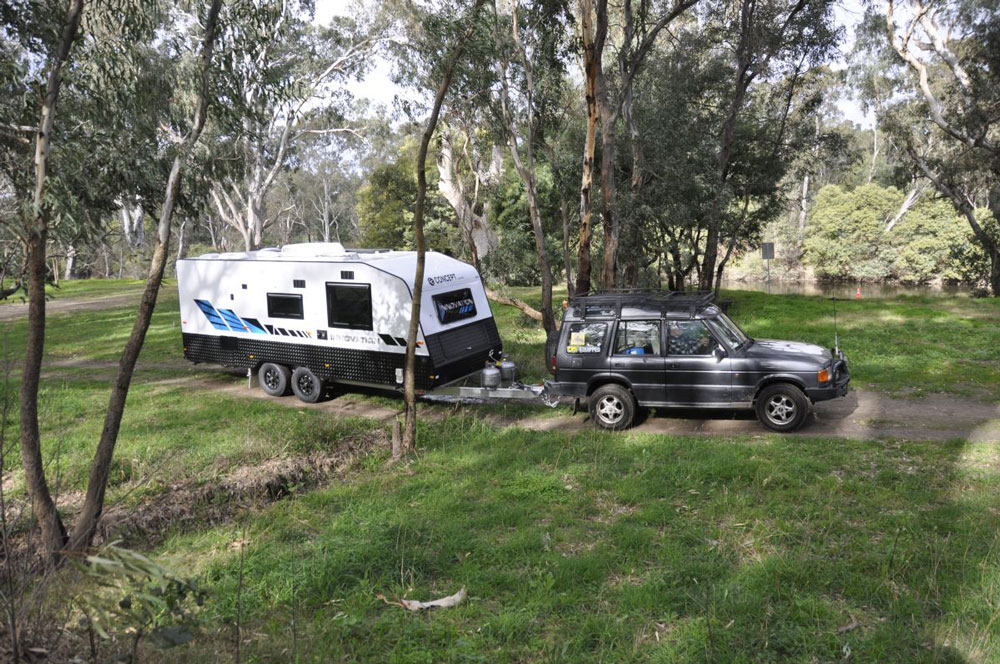
Getting ready for a caravanning adventure is more than just buying a portable house on wheels, hitching up, and hitting the road. Taking the time to prepare properly for towing will not only keep you safe but also make your trip far more enjoyable and stress-free.
Australia is a vast and beautiful country, full of incredible places to explore. So, take it slow, stay prepared, and as the truckies say, keep it safe, mate!
In the market for your first caravan? We have an extensive range of caravans for sale at Only Vans, including hybrid caravans. If you like a bit of off road adventuring, we have off road caravans for sale, plus off road campers, and more!
Found your perfect purchase? Let’s make financing just as easy!
Work with Australia’s best-reviewed finance broker for a great deal and a stress-free experience. With 2,500+ glowing Google reviews, you can trust you're in good hands! See what our happy customers say in Credit One reviews, or jump right in and crunch the numbers with our handy loan repayment calculator. Your ideal financing solution is just a few clicks away!
